- Home
- Courtney Milan
The Turner Series Page 46
The Turner Series Read online
Page 46
She wished she was free to revel in the heady feel of flirtation without feeling the future press against her in suffocating reminder of the penury that waited.
Sir Mark’s long strides had brought him back to the protective crowd of women once again.
Everyone had been watching them. Jessica stood and brushed her skirts into place. Then she shook out the jacket he’d left behind. The fabric was warm with the heat of his body. It smelled of him—clean, fresh male, with a dab of sea spray. Slowly, she donned the garment. It was large on her, and overly warm. Still, it felt like a friendly embrace—comforting and casual, without importuning her for more. She couldn’t remember the last time she’d had a simple hug from a man.
He was surrounded by women again—a gaggle of concerned villagers, clucking over him. No doubt making sure that he’d not been tainted by her.
He laughed and then spoke, gesturing with his hands. And then, when he’d tamed their frightened outrage, he turned and glanced at her. A warm breeze swirled up. It lifted the collar of his jacket against her neck.
No. She had no notion how to seduce a man like this. He had no pampered vanity to flatter, no hidden desires to draw out in the open. He wanted her. He thought of her. And he admitted it so openly that she feared it would be impossible to lure him into dishonesty.
Worse; he was luring her into the truth. He gave her a private smile, one that made a hollow of her chest.
She had thought that when she felt again for the first time, it would be something gentle, something clean. Some small and silent pleasure, perhaps. But it was not some quiet return to feeling that came to her. It was the sharp, painful tingle of a limb being slapped from sleep.
She wanted to tell him the truth. She wanted to relinquish all hope of seduction, so that she could enjoy the company of a man who didn’t lie. She wanted him to like her with the same easy confidence with which he liked himself. The impossibility of it made her ache.
Jessica reached out and plucked a dandelion from the grass. It was a fragile, delicate shell of white spores; when she snapped its stem, a few seeds detached from the round head.
He was still smiling at her, a bright golden grin as blinding as the sun.
She raised the dandelion to her mouth and blew. White seeds scattered on the breeze, whirling in his direction. Maybe it was her imagination. The spores separated too quickly for her to follow their path, and it would have been a strange wind indeed that blew those tiny parachutes across twenty yards of picnic.
Still, after a few seconds he raised his hand, almost in greeting. And then he closed his fingers, as if snatching something invisible from the air.
Chapter Six
“DID YOU NOT SEE ME, Sir Mark?” James Tolliver demanded.
Mark pulled his gaze from Mrs. Farleigh’s form to contemplate the skinny child by his side.
“Your pardon, Tolliver. Were you trying to catch my attention? My mind is…” He trailed off, thinking of the red silk of Mrs. Farleigh’s skirts, spread on the blanket she’d set out. The carmine of her gown had been in perfect contrast to the pale perfection of her skin. But it wasn’t the cold marble of her complexion that drew him. It was the hint of fire that he’d sensed beneath. As if she were unstable, dangerous and all too enticing. The buzz of insects swirled around him, loud in his ears. “My mind is elsewhere.” Mark turned his head to focus on the young man. “My thoughts have all gone awandering.”
“I didn’t mean just now. I meant before you left to speak with Mrs. Farleigh. I made the signal.” Tolliver held up his hand, his thumb curled to meet his two middle fingers. He twisted it at an angle.
“A signal?”
“The signal,” Tolliver corrected.
Mark stared at the boy’s hand in puzzlement. With his little finger peeled back that way, his hand looked like a small dog, ear cocked, looking on quizzically.
Tolliver tapped the blue rose on his hat, glanced at the women around them with a glare that bespoke a world of suspicion and dropped his voice. “You know. The signal.”
“I’m not familiar with that.” Mark didn’t lower his voice.
Tolliver blushed and looked about furtively. “Shh! Do you want them to hear?”
“I hadn’t realized we were in enemy territory. Who is this them that we fear?”
Tolliver made the signal once again and pointed to his hand. “Didn’t I do it right? It’s supposed to be the signal for ‘Watch out—Dangerous Woman Ahead.’”
Mark counted slowly. One. Two. Three…
“Tolliver,” he finally said, “where did you learn that signal?”
“It was in the introductory pamphlet. A Youth’s Guide to the MCB, by Jedidiah Pruwett, which I—”
“There’s a pamphlet?”
“Yes, advertised in the paper! Send one shilling to…” Tolliver trailed off, glancing at Mark. Maybe it was the curled fists, or the clenched teeth, that gave away Mark’s anger. “That…that wasn’t your pamphlet?”
“No.”
When Mark had sold the rights to his book to a publisher, he’d not given a thought to any potential profit. Philosophical volumes—even ones written for the common man—rarely sold well. And besides, he didn’t need the money. His publisher had paid twenty pounds for exclusive and unlimited rights to the work; Mark had been convinced they’d only given so much because his brother was a duke. Said brother had tried to convince him to hold out for royalties, but Mark only cared to see the volume in print. He’d donated his twenty pounds to charity and thought nothing more of it.
He’d not minded when he heard that the book was in its third printing—or even its twelfth. But then had come the Illustrated Edition. Followed shortly by the Royal Edition—printed particularly for Queen Victoria, bound in leather dyed to match her favorite color. The Floral Edition. The Edition with Local Commentary—that one had included little woodcuts of Parford Manor, Mark’s room at Oxford and his brother’s home in London. Not to mention the infamous Pocket Edition.
He suspected his publisher had a Woodlands Edition ready for production, complete with illustrations of adorable talking deer. Somehow, they would find a way to make the creatures look like him.
No. It wasn’t the money Mark regretted relinquishing. It was the control. And even without a Woodlands Edition, he’d lost it completely. Between the newspapers that tracked his every move and Jedidiah Pruwett, who’d founded the Male Chastity Brigade, he’d had no peace at all.
“Don’t tell me where you sent your money.” Mark drummed his fingers against the seam of his trousers. “I’d really rather not know.”
Tolliver shook his head in confusion. “In any event, that’s where I learned that signal. And I used it today because she’s a danger, she is.”
“That’s what the MCB is teaching? To avoid dangers like that?”
Tolliver swallowed, looking around. Mark’s outburst had drawn the attention of everyone around him. Miss Lewis, the rector’s daughter, had frozen midconversation with her mother and a few others. They turned to Mark as one.
He hated being the center of attention. Especially here in Shepton Mallet, with the green, familiar silhouette of the hills framing the gathering. It reminded him of his childhood, of those months when everybody would pay attention to his mother, watching her as if she were some crazed beast about to spring. As if they might goad her into doing so.
Nobody was thinking of that now—nobody but Mark. His own personal preferences counted not one whit when it came to a matter of right and wrong. He took a deep breath. Unlike his mother, he didn’t need to gibber. He didn’t need to scream. He didn’t need to threaten. People liked him, and that gave him a responsibility.
“I assure you,” Mark said, more quietly, “I have never endorsed such unkind behavior.”
“But, Sir Mark! She’s wearing scarlet. She made you give up your coat. You can’t really believe she’s an innocent. She…she could be a fallen woman!”
“There is no such thing as a fallen woman�
��you just need to look for the man who pushed her.” He shouldn’t say that, not here. So many people might recognize its source. But no one cringed from his mother’s aphorism. Instead, the rector’s wife gave a thoughtful shake of her head, looking back to Mrs. Farleigh.
“Tolliver,” Mark said, “I adhere to the law of chastity because I don’t believe in pushing women. That’s what it means to be a man. I don’t hurt others simply to make myself feel superior. Gossip can ruin a woman as surely as unchaste behavior. True men don’t indulge in either. We don’t need to.”
Tolliver raised stricken eyes to Mark. “I—I didn’t think of that.”
Most people didn’t.
Mrs. Farleigh had donned his coat. Even that unrelieved, ill-fitting navy could not dim her beauty.
“When someone falls,” Mark said, “you don’t throw her back down in the dirt. You offer her a hand up. It’s the Christian thing to do.” But the thought of taking her hand didn’t make him feel Christian at all. His mind kept slipping back to that evening. Not to her form, dripping wet, but to the wild light that had come into her eyes the moment when she’d told him she hated him. The memory still sent a queer little thrill through him. He didn’t understand it at all.
To his credit, Tolliver didn’t flinch. “What…what do I do?” he asked.
Miss Lewis stood and said, “We go and escort her over here.” She cast her mother a defiant glance. Mark held his breath as the two started across the field. But nobody stopped them.
JESSICA WASN’T SURE WHAT Sir Mark intended when he came up to her an hour later. The picnic was breaking up. Blankets were being folded, and the remains of the repast tucked away for future consumption.
He’d not talked to her in all that intervening time, but she was sure he’d said something about her. The rector’s daughter had come up to her and had admired her gown and hair. The girl had even walked with her, introducing her to women who’d not so much as turned in her direction a week ago at service. She’d promenaded beside Miss Lewis in a growing muddle of confusion, and the passage of time had only served to strengthen it.
Sir Mark stood before her now, and she wasn’t sure if she should be grateful to him. She had been practically an outcast before this afternoon. He’d diverted the flow of gossip, as if he were Hercules and shifting a river on its course was no hardship.
It wasn’t merely that the people had heeded his sterling reputation. Another man might have been diffident and uncomfortable, standing before everyone in his shirtsleeves. Sir Mark, though, acted as if his dishabille were normal. He managed to look fully attired—so much so that she would have felt awkward and ungainly had she pointed out that he lacked a coat.
He didn’t say anything. He simply watched her from a few feet distant. She snapped the blanket she had brought in the air. He snagged one corner as it floated past him and helped her fold it once, then twice, before he passed his gathered ends to her.
He did it so carefully that their hands did not touch. Still he didn’t speak.
Jessica broke the silence. “Thank you for your assistance. You must be…here for your garment.”
One of her hands had already gone to the cuff when he shook his head.
“You’re wrong about that. I’m here to walk you home,” Sir Mark said. “You live up the road beyond the old sawmill, do you not?”
Jessica placed the blanket in her basket. “What do you mean, walk me home?”
“Walk.” He held up two fingers and mimed. “Most people learn how to do it at a young age. I’ve observed that you’re reasonably proficient in the activity.”
“That’s not what I meant,” Jessica sputtered.
“Then perhaps you are unsure as to the meaning of the word home? Although—fair warning—I do mean to take you a roundabout way, if you can bear my company for a full half-hour. I thought we’d go along the Doulting Water, and then up the hedgerow.”
“But—”
“Ah, it’s the middle word you’re objecting to, then.”
“Middle word?”
His eyes met hers, intensely blue. She swallowed hard, her stomach clenching. “You.” He said the word as if no other person existed, as if the dissipating crowd stood at a distance of many miles.
She couldn’t say anything. She carefully set her basket on her arm and looked away. She glanced about helplessly, but for once, nobody was hurrying over to separate them, to save Sir Mark from conversing with a woman like her. What had he said to them? And why was he doing this to her?
She straightened, not wanting him to see her confusion. “Surely you plan on defining that term as well?”
“Even if I had the temerity to explain you to yourself, I lack the ability. I don’t know you well enough. That is, after all, the purpose of the endeavor in the first place.” He held out his arm for her. As if she could take it. As if they were just two friends walking together.
Sir Mark did not make any sense at all.
“But—but— This can hardly be—”
“Proper?” He shrugged. “I have been assured it is. Country rules, after all—I have it on the best of authority that a demure little walk is perfectly acceptable, so long as we stick to the lanes and the hedgerows.” He reached out and took her hand, just long enough to guide it to his elbow in unthinking assurance. Even through her gloves, she felt the warmth of his arm through the linen of his shirt. And it was just his shirt that lay between his flesh and her hand. He wasn’t wearing his coat—she was. But he took no notice of it, while she was painfully aware of the lack.
“The best of authority! I should like to see that etiquette book.”
“I didn’t consult a book.” He gave an unconcerned wave to the rector’s wife as he walked her out toward the gate, as if the woman’s suspiciously narrowed gaze were nothing to worry about. “I wrote to the Duchess of Parford and asked.”
She bit her lip, her hands clenching. It took her a moment to identify the emotion that fluttered in her stomach: dazed bewilderment. “The Duchess of Parford. You wrote to the Duchess of Parford about me?”
“Twice now.”
Jessica fell silent, unsure how to respond. He spoke in such an easy way—as if he dashed off letters to duchesses on a regular basis. Well. His brother was a duke, after all. He probably did. She supposed it shouldn’t come as such a surprise. She’d simply forgotten how high his family was. No, not forgotten; he’d made her overlook it, through some trick of his easy manners.
Perhaps that was why she let him guide her down the cobblestoned street in comparative silence. It wasn’t until they reached the shade of the trees that lined the water that Jessica spoke again.
“What did you say to the duchess?”
“She is my sister, you know—married to my brother. And not nearly so intimidating as her title makes her sound. I wanted to stave off any talk in town, so I thought that getting her imprimatur would be useful. After I’d sent the first letter, Margaret naturally bombarded me with questions.”
“Questions?” The river was running through high, grass-covered banks. A wood bridge crossed over one arm of the water, rushing into a millrace, but the main body burbled by noisily to her right.
“She wanted to know how long I’ve known you. Are you pretty? Clever?” He cast her a sly glance. “I told her, not long enough, and to the last two—very.”
If she’d been fifteen, she’d have blushed. As it was, Jessica felt a warmth collect on her skin, in her lungs. “If I didn’t know better, I should think you were flirting with me.”
He gave her an unreadable look. “Well. If you say I’m not, you must be correct. Still, I don’t endorse your conclusion.”
This left her equally confused. “But you’re—you’re—”
“A virgin?” There was a note of amusement in his voice. “True. But just because I don’t believe in poaching out of season doesn’t mean I can’t hunt.”
Her mouth dried.
“And here I’d thought we had left those polite protestat
ions behind us,” he said. “I like you, Mrs. Farleigh. It’s that simple.”
“I—I—”
“And you hate me.” He smiled at her, as if he’d seen through her contrivance. “You see, it’s perfectly safe for the both of us. You know I shall never impose upon you. And until you’ve decided not to hate me, I need not worry that you’ll enlarge on our acquaintance. We neither of us have expectations.”
“Safe. You think I’m safe.” She glanced at him. He seemed perfectly sane—no hint whatsoever of madness showed, except his appalling words. “Must I remind you that I tried to seduce you?”
“True.” He shrugged. “But I don’t put much store by that, as you weren’t very good at it.”
Jessica gasped, pulling her hand from his arm. “Why, you—you—”
“You didn’t really mean it,” he said, with a wave of his hand that wasn’t much of an apology.
Jessica turned on him. “I’ll have you know I meant every word of it! If you’d been any other man, I’d have succeeded. And you’d have—”
“You’d have lost your nerve.” But he was watching her now, the solemn expression on his face belied only by a tiny quirk of his lips.
“And I don’t know what you mean when you say I wasn’t any good at it. I was excellent.” She turned to him. “I am excellent. Why, I could still have you, right now, you arrogant cad. And I would, except—”
“Except for the little fact that you hate me.” His eyes twinkled at her.
“Yes.” She folded her hands. “Except for that.”
They walked on in silence. Any other man, at being told that he could be seduced were it not for the fact that the woman in question hated him, would have been livid. Sir Mark, however, whistled tunelessly as they walked and leaned to pick up a stone. He skipped it across the water, as soon as they passed a calm section.
“I’m learning a great deal about you,” he finally remarked. “For one, you’re a competitive little creature. I’ll wager you were one of those children who would do anything, if dared to do it.”

 Her Every Wish
Her Every Wish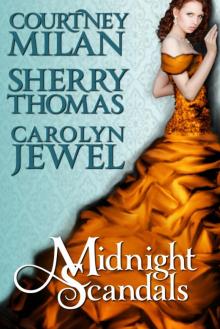 Midnight Scandals
Midnight Scandals After the Wedding
After the Wedding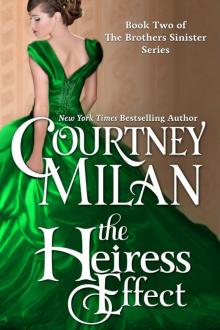 The Heiress Effect
The Heiress Effect Unraveled
Unraveled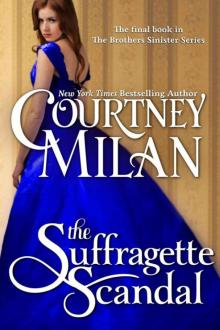 The Suffragette Scandal
The Suffragette Scandal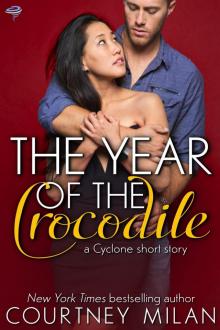 The Year of the Crocodile
The Year of the Crocodile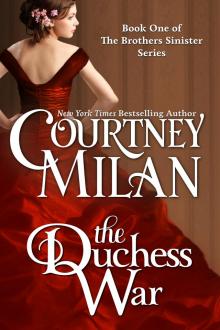 The Duchess War
The Duchess War What Happened at Midnight
What Happened at Midnight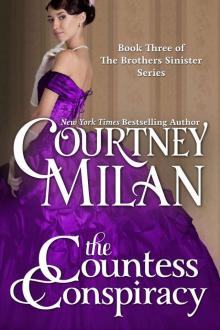 The Countess Conspiracy
The Countess Conspiracy Proof by Seduction
Proof by Seduction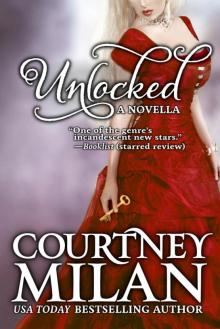 Unlocked
Unlocked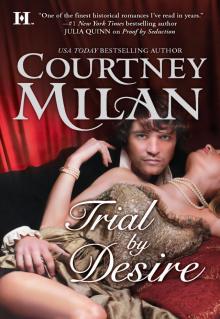 Trial by Desire
Trial by Desire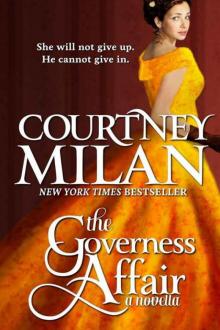 The Governess Affair
The Governess Affair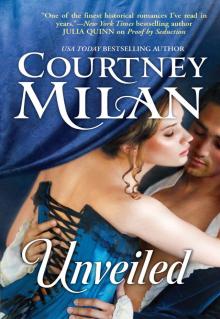 Unveiled
Unveiled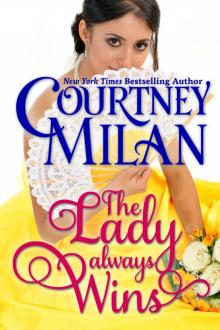 The Lady Always Wins
The Lady Always Wins Trade Me
Trade Me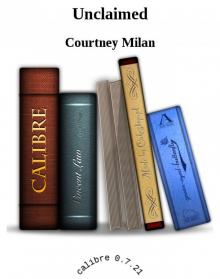 Unclaimed
Unclaimed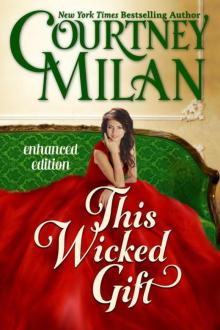 This Wicked Gift
This Wicked Gift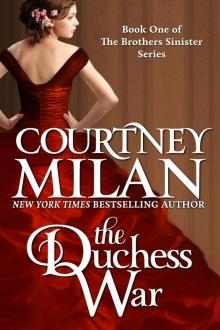 The Duchess War (The Brothers Sinister)
The Duchess War (The Brothers Sinister)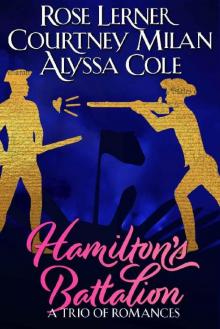 Hamilton's Battalion: A Trio of Romances
Hamilton's Battalion: A Trio of Romances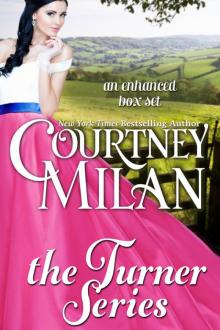 The Turner Series
The Turner Series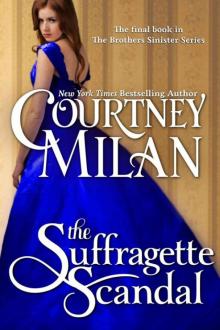 The Suffragette Scandal (The Brothers Sinister)
The Suffragette Scandal (The Brothers Sinister)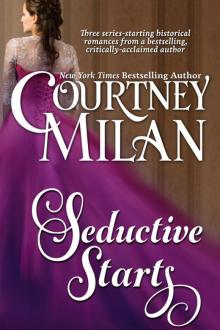 Seductive Starts
Seductive Starts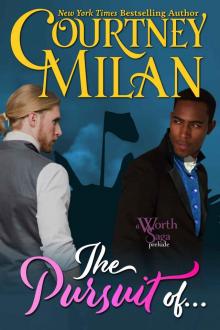 The Pursuit Of…
The Pursuit Of…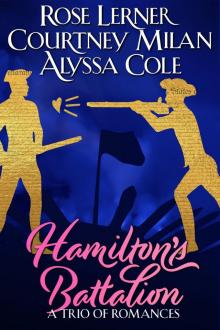 Hamilton's Battalion
Hamilton's Battalion The Carhart Series
The Carhart Series Seven Wicked Nights
Seven Wicked Nights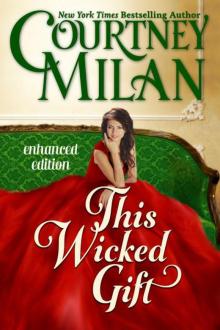 This Wicked Gift (A Carhart Series Novella)
This Wicked Gift (A Carhart Series Novella)